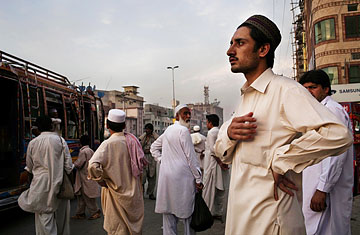
A street scene on GT Road, the route Abdullah Yusuf Azzam is believed to have travelled to his routine Friday prayer at an Arab Mosque in the University Town neighbourhood of Peshawar, in Pakistan
(3 of 3)
A Multitude of Motives
For all that bitter history, on the rare occasions that the Afghan Arabs once allied to Azzam meet, few believe that the enmity between him and al-Zawahiri led to the assassination. "Zawahiri was a nobody," scoffs Umme Mohammad. "He didn't have the power or the following to do something like that." Muzhda, Azzam's translator, isn't so sure: "Peshawar was a city where if you had money, you could pay to get any work done, from street-cleaning to assassinations."
That is doubtless true, but there were others besides al-Zawahiri and his supporters who could have availed themselves of the same services, and had every reason to want to. As the Soviets withdrew, the Afghan mujahedin factions, deprived of a common enemy, fell upon each other in the beginnings of a brutal civil war that would last five years and eventually usher the Taliban into power. The Afghan Arabs were forced to take sides. Most, including al-Zawahiri, allied with Hekmatyar, a fearsome Pashtun warlord who also benefited from support from Pakistan's intelligence agencies — the very people who would have run any investigation into Azzam's assassination. Azzam backed Hekmatyar's great rival, Ahmad Shah Massoud, an ethnic Tajik whom he anointed "the new hero of jihad" — and who was eventually murdered by an al-Qaeda hit squad two days before the attacks on the World Trade Center and the Pentagon. Azzam's embrace of Massoud infuriated Hekmatyar. "The first thing that came to mind when I heard the news of Azzam's death was that Hekmatyar was behind it," says Abdullah Abdullah, Massoud's aide and later Afghanistan's Foreign Secretary. "There was a lot of money being channeled to Hekmatyar at the time, and Azzam's support for Massoud would have had an impact on that."
Still, argues journalist Ismail, there were other groups who would have had more invested in seeing Azzam dead. Like al-Zawahiri, Azzam saw Afghanistan's potential as an international jihad training ground. Soon after the launch of the Palestinian intifadeh in 1987 and the formation of Hamas, an openly Islamist branch of what had up to then been a Palestinian resistance dominated by secular nationalists, Azzam started taking young men from Palestine to Afghanistan to train in special camps. The Palestinians went in under false passports, to protect them from Israeli intelligence. But the existence of the camps came to light after a foiled car bombing at a Marriott hotel in Tel Aviv. The would-be bombers confessed, which led to the discovery of several militant cells throughout Israel, the West Bank and Gaza. "They didn't know anything about each other," says Ismail. "Their only common link was that they had all trained against Israel in Azzam's camps." A blunt warning to Azzam arrived by a curious messenger — a representative of Yasser Arafat's Palestine Liberation Organization, which Azzam had long dismissed for its secular ideology, went to Peshawar. "Israel is after you," the envoy told Azzam, according to Ismail. "Take care." "That was the beginning," says Hutaifa. "Mossad knew that my father had built a very strong foundation against Israel, and that after Afghanistan, it would be Israel's turn." Jamal, Azzam's nephew, is convinced Mossad was behind his death.
The Israelis may indeed have had a motive. But nobody has come close to showing that they killed Azzam. Ahmad Zaidan, a Syrian journalist who covered Azzam's assassination, throws up his hands in exasperation when asked who might have planted the bomb. "It's an enigma," he says, "just like the others. Who killed [John F.] Kennedy? Who killed Benazir Bhutto? I can't make up my mind who would have wanted to kill him the most."
Would history have been different if Azzam had lived? He was no angel, by any standards other than those of jihadis. But many believe that he would have been a moderating force on bin Laden, and that his scholarship and charisma would have tempered al-Zawahiri's crazy radicalism. Azzam's son-in-law, Anas, thinks that Azzam would have continued his mission to liberate Muslim lands from the grip of infidels. "He called people to fight in Afghanistan because it was occupied by the Soviets," Anas says. "If he saw what happened in Iraq and what is happening in Palestine he would say the same thing. But what is going on in the name of jihad, killing civilians, kidnapping, hijacking airplanes, explosions in the public places — that is not what Abdullah Azzam called a jihad."
It is a comforting thought, up to a point, but we will never know if it is well founded. Nor, probably, will we ever know who blew up a car in Peshawar 20 years ago. A lot of people wanted Abdullah Azzam dead.
— with reporting by William Lee Adams / London and Ershad Mahmud / Peshawar